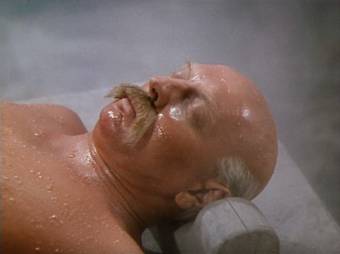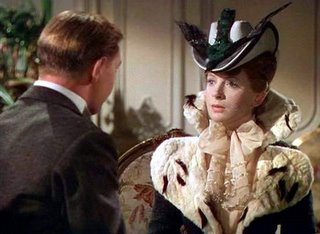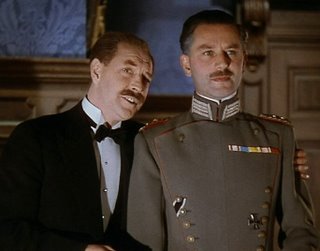
The Life and Death of Colonel Blimp (1943)
Directors: Michael Powell and Emeric Pressburger
It is my considered opinion that the collaboration between Michael Powell and Emeric Pressburger was the greatest of its kind in the history of entertainment. How many directors could claim such genuine masterpieces as I Know Where I’m Going!, Black Narcissus, A Matter of Life and Death, The Red Shoes, One of Our Aircraft Is Missing, and of course, The Life and Death of Colonel Blimp—Pressburger’s favorite film—and serve as writers and producers for many of their films? I could have chosen any of these films, which I view regularly, to write about, but Colonel Blimp is so decidedly British that I think of it as an ideal introduction to this decidedly British team. (Never mind that Pressburger was Hungarian. He was a fervent Anglophile most of his life.)
Colonel Blimp is an early entry in the Powell/Pressburger canon, but it already has a consistent point of view that would be a hallmark of the team. It also includes a number of their informal stock company—Roger Livesey, previously seen in I Know Where I’m Going!; Anton Walbrook, cast later in The Red Shoes; Deborah Kerr, later the star of Black Narcissus; John Laurie, also from I Know Where I’m Going!; and second-unit cameraman Jack Cardiff, whose distinguished career as a cinematographer would include several Powell/Pressburger films, most notably Black Narcissus.
A Powell/Pressburger film always seems wistful, watching its characters balance between tradition, honor, and simplicity and a magnetic modern world. Interestingly, Powell/Pressburger women generally are very strong-minded and ambitious, a focal point for the tension between modernity and tradition in most of the team's films. Colonel Blimp, therefore, is a bit of an anomaly by placing General Clive Wynne-Candy (Roger Livesey) at the center of the vortex, a career soldier whose fair-fight ethos slams up against the ruthlessness of 20th century warfare. Nonetheless, the three women in Wynne-Candy's life during the 40-year span of the film—all played by Deborah Kerr—become the embodiment for him of the ideal, the never-changing aspects of his world view.
The film begins in the present, with a messenger speeding on a motorbike to deliver a message to a young British officer awaiting orders about a military exercise, the very picture of the revved-up modern world. "War starts at midnight. Make it real," the message says. The officer decides to make it very real by launching a sneak attack before midnight. He surprises Wynne-Candy, the head of the Home Guard, in his club's Turkish bath and declares him and every other sweating body in view prisoners of war. Wynne-Candy protests that the war doesn't start until midnight, to which the brash officer replies that by launching a surprise attack, he was making it "real." He adds insult to injury by declaring that he will never become as complacent as the fat, moustachioed Wynne-Candy. This remark enrages the general, and he dunks the officer in the bath while upbraiding him that he has no idea how Wynne-Candy came to have his belly and his moustache. Since we in the audience don't know either, Powell and Pressburger oblige us with the rest of the movie, a flashback begining in the Turkish bath wherein lingers a young Clive Candy just back from the Boer War, humming an opera tune, "Je suis Titania," from Ambroise Thomas' Mignon that will create an incident later in the film.
Candy has written about his experiences in South Africa for a London newspaper, and a letter from an English tutor in Germany, Edith Hunter (Kerr), finds its way to him. The letter urges him to come to Berlin and stop horrible rumors of torture and other atrocities being spread abo
 ut the British forces in South Africa. Against his CO's directive, Candy travels to Berlin, where he meets Miss Hunter. She takes him to a cafe frequented by the rumor monger Kaunitz (David Ward) where Candy can confront him. Kaunitz's crowd and Candy alternately bribe the cafe band to play their respective songs ("Je suis Titania" in Candy's case), and Kaunitz at last becomes enraged by Candy's interference. The two men trade insults until Kaunitz spits in Candy's face, and Candy punches him. The incident results in a formal challenge to a duel.
ut the British forces in South Africa. Against his CO's directive, Candy travels to Berlin, where he meets Miss Hunter. She takes him to a cafe frequented by the rumor monger Kaunitz (David Ward) where Candy can confront him. Kaunitz's crowd and Candy alternately bribe the cafe band to play their respective songs ("Je suis Titania" in Candy's case), and Kaunitz at last becomes enraged by Candy's interference. The two men trade insults until Kaunitz spits in Candy's face, and Candy punches him. The incident results in a formal challenge to a duel.The rituals attendant to the duel are laid out very carefully and in great detail. The courtesies observed for this barbaric feud-settler give the viewer a very clear idea of how seriously the phrase "officer and gentleman" was taken when Candy cut his teeth. Because Candy's insult was to the entire German army, any of its officers can duel with him. The task falls to a reluctant Theo Kretschmar-Schuldorff (Anton Walbrook), whom Candy has never met.
The audience is treated to only the opening parries of the duel as the camera dollies up and out a high window of the gymnasium where it is taking place. The directors let a nurse relate the results. Candy has nearly had his upper lip cut off. This injury is the reason behind Candy's moustache. Edith attends him and Theo, who is recuperating from a slashed forehead at the same nursing home. Candy and Theo become fast friends who share the same sense of duty while recognizing that they never had a real quarrel. When at last Candy and Edith are able to return to England, Theo sheepishly confesses that he and Edith have fallen in love. Candy enthusiastically congratulates Theo, but when Edith gives him a kiss good-bye, Candy realizes that he has fallen in love with her.
The second act takes us to World War I, and Candy is on the move in France. Unable to reach his destination, he finds food and shelter at a French convent, where he spies a nurse, Barbara Wynne (Kerr), who bears a striking resemblance to Edith. He ascertains some particulars about her which he will use to track her down at home. Soon, he receives the news that the Armistice has been negotiated, and Candy is delighted that victory was won without resort to dirty pool.
His sportsmanlike regard for the Germans seems naive and even moreso when he meets up with
 Theo in a POW camp some months later, after he has wooed and won Barbara. Theo snubs him, but later phones before he is shipped back to Germany to apologize. Wynne-Candy invites him over to dine with some distinguished gentlemen. All express supreme confidence that England will bail Germany out of its difficulties. Theo sneers at this assembly when he is with his fellow officers on the train, calling them children. Theo recognizes that the rules of the game are changed, and were changing as early as Theo and Clive's first meeting when vicious slurs were being used in Germany to discredit the English.
Theo in a POW camp some months later, after he has wooed and won Barbara. Theo snubs him, but later phones before he is shipped back to Germany to apologize. Wynne-Candy invites him over to dine with some distinguished gentlemen. All express supreme confidence that England will bail Germany out of its difficulties. Theo sneers at this assembly when he is with his fellow officers on the train, calling them children. Theo recognizes that the rules of the game are changed, and were changing as early as Theo and Clive's first meeting when vicious slurs were being used in Germany to discredit the English.Act III is, of course, set during World War II. The home Clive and Barbara inherited from Clive's beloved Aunt Margaret (Muriel Aked) is bombed. No longer able to fight in combat, Wynne-Candy becomes head of the Home Guards. He encounters Theo yet again as he is trying to enter England as a refugee. Edith has died and their two sons have become Nazis. He says he grew "homesick" for England, pure and simple, the home of his beloved wife. Clive pulls some strings to see that he is granted asylum but fails to grasp the evil and lawlessness of Nazism that Theo begs him to see. Clive still believes that a war fought fairly is a winning strategy and the only honorable conduct for military men. When their evening together has passed, Wynne-Candy asks his driver Angela "Johnny" Cannon (Kerr) to take Theo to his hotel. Theo is struck by Johnny's resemblance to Edith and realizes that what Clive told him is true—Clive never got over his love for Edith. The closing scene has Clive standing near the site of his bombed house, which is now a water reservoir. He is reminded of a promise he made Barbara on the steps of that house, and announces his compliance: "I still haven't changed."
I realize I may have tried your patience with this lengthy synopsis, but I didn't convey even the half of it. This is a rich and intricate look at 40 years in the life of a career soldier from England's upper class, but curiously titled. During the period in which Clive Wynne-Candy lived, a cartoon character named Colonel Blimp was created by David Low. Blimp was a snobbish, reactionary buffoon whose preposterous statements were barbs aimed directly at the anti-democratic policies of the British government. It's hard to reconcile the cartoon Colonel Blimp with the honorable and lovable Wynne-Candy. They live as one in one respect—a blindness to change and a stubborn belief in the rightness of their own convictions. I surmise, therefore, that the title refers to the life and death of an ideal as the ritualistic honor of the career soldier gave way to a people's army and the brutality of modern warfare. In this respect, Colonel Blimp is a much more realistic and unblinking look at the passing of a modern age of chivalry than the similarly themed Grand Illusion.
The performances are uniformly outstanding. Indeed, Kerr was never better, creating three distinct women that Clive never really sees for what they are. The look of this film is lush on the homefront and gritty on the field of battle. A fine example of the film's exquisite economy of storytelling is the sequence in which we see Aunt Margaret's blank study walls fill up, scattershot, with the heads of wild animals Candy bagged during peacetime to keep himself occupied. This sequence, shot by Jack Cardiff, sealed his fate alongside Powell and Pressburger making several movie masterpieces. An extra on the DVD of the film mentions that Winston Churchill tried to suppress the movie for its sympathetic and nuanced portrayal of a German and because Churchill wanted to dispel the notion that Colonel Blimps still had a place in the modern British army. Actor/director Stephen Fry, who was filmed for this extra, mused that, in fact, Churchill himself was Blimp. Whatever you may think of that assessment, there can be no doubt that the "Blimp" of this extraordinary film is anything but a blustering windbag. He does the British Army and his creators, Michael Powell and Emeric Pressburger, proud. l


2 Comments:
At 12:27 AM, Anonymous said…
Anonymous said…
It's interesting to consider that in the P&P war-time films, the notion of fighting to preserve what was good and decent about the world before the world went crazy, is pre-eminent; genuine judeo Christian values, humanism, and culture. It's also there in The 49th Parallel, A Canterbury Tale and even, in a muted, more tangential sense, I Know Where I'm Going! (because the war, whilst still on when that film was made, was winding down). It's great to watch A Canterbury Tale after The Life and Death of Colonel Blimp because they explore the themes they touch on in occasionally contradictory terms in Colonel Blimp; in that film the Canterbury Cathedral takes over from Blimp himself as the symbol of something ineradicable and eternally righteous. Blimp's dilemma isn't actually solved in the film. He's actually, if you pay attention, blind all the way through it; blind to British Concentration camps in the Boer War; blind to Imperial cruelty returning in the repressed, in the cruel South African officer he encounters in WW1. Clive is, in fact, never quite a man in any time, because he's a man of all time, who fights for and believes in the best human qualities. His refusal to surrender his chivalry in the end, his sense of common humanity despite being paid to end lives, in a rich and tragi-comic irony. In the end he's one of those entities of the past Powell and Pressburger say we ought to hang on, even if many aspects of the past are best forgotten.
It occurs to me that considering a 230-year old constitution was just used to pull Bush's fangs out, that P&P have a point.
At 11:57 AM, Lady Wakasa said…
Lady Wakasa said…
Marilyn - Terry Gross did an interview with Thelma Schoonmaker (Michael Powell's widow) which was rebroadcast on 4 July (original broadcast 31 May 2005). Think you'd find this really interesting - especially with their links to Martin Scorsese.
Post a Comment
<< Home